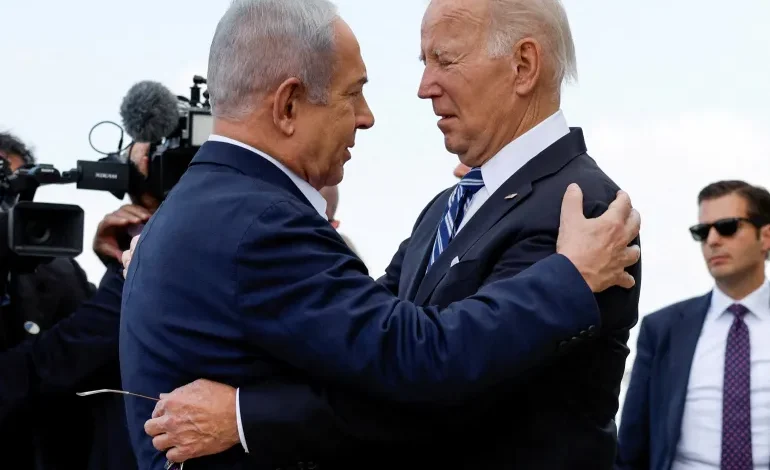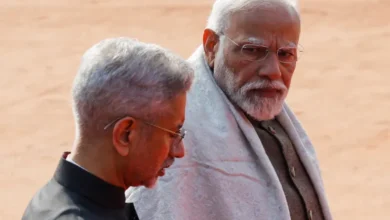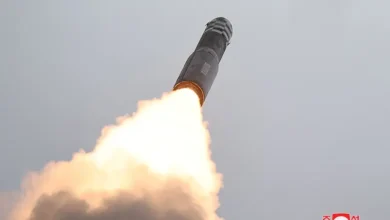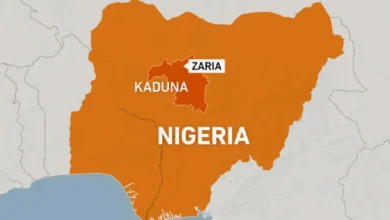Biden’s ‘Netanyahu first, US second’ strategy was a total disaster
Hussein Chokr

“Were there not an Israel, the United States of America would have to invent an Israel to protect her interest in the region.” These were the words of then-Senator Joe Biden as he made his argument for US support for Israel during a congressional debate on arms sales in the Middle East in 1986.
He clearly did not see the possibility of a clash of interests between Israel and the US back then. Ironically, 38 years later, his presidency would bring to the fore just how much US regional interests no longer align with the Israeli government’s behaviour.
The Biden administration gave Israeli Prime Minister Benjamin Netanyahu a free hand to do as he pleases, not just in Gaza, but across the Middle East. Netanyahu is doing everything he can to stay in power in order, which has meant prolonging Israel’s war in Gaza and expanding Israeli aggression into Lebanon, Yemen and even Iran.
This has wreaked havoc in the Middle East and directly undermined US foreign policy interests in the region.
The US strategic interest
The Middle East holds significant strategic importance for the US. It is home to vast reserves of oil and natural gas which are essential to the US economy and the US-dominated global economy. Any disruption in the supply of oil or gas from the region can have unprecedented consequences for global energy security.That is why, the US has favoured relative political stability in the region, especially after its 2003 invasion of Iraq, and the 2001-2021 occupation of Afghanistan demonstrated just how dangerous and costly military adventurism can be in the region.
Since the first Obama administration, the US has been pursuing a national security strategy that aims to reduce liabilities and stabilise the region in order to withdraw and focus resources on China and Russia, perceived as more pressing threats. As part of this policy, Washington has been working to integrate Israel with its Arab neighbours, establishing a Middle Eastern security arrangement similar to NATO, and boosting economic ties through initiatives like the India-Middle East-Europe Economic Corridor.
The Biden administration’s National Security Strategy continued this policy, as it announced the end of the combat mission and withdrawal of US troops in Iraq and continued efforts to expand Israeli-Arab normalisation.
But the US pivot out of the Middle East was put on pause indefinitely, when Biden pledged unconditional support for Israel in the aftermath of the October 7 attack by Hamas. Washington has been forced to increase its military presence in the region and spend more than $22bn on military aid to the Israeli army and its own military operations in support of it. This unconditional commitment to Israel is undermining the US’s long-term strategy of focusing on Russia and China and allocating more military aid to Taiwan, Ukraine, South Korea and Japan.
Netanyahu first, the US second
For almost 15 months now, the US has mobilised its political, diplomatic, economic and military capabilities to stand behind Israel. It has deployed navy ships, aircraft carriers and troops in the Mediterranean and the Red Sea and engaged in direct military activity in the region to help shield Israel.
On the international stage, it has provided unprecedented support for the Israeli government, attacking and defunding international institutions, undermining the UN and putting pressure on allies not to budge to public outrage about the genocide. US officials have unreservedly defended Israel’s massive war on Gaza that has killed at least 45,000 civilians, the majority of them are children and women, displaced 1.9 million within the Gaza Strip and destroyed civilian infrastructure, schools and hospitals.
The US has stood behind Israel as it attacked and devastated Lebanon, killing more than 4,000 people, and as it invaded Syria, occupying even more territory in the southern part of the country. It supported Israeli provocation against Iran: the bombing of the Iranian embassy in Damascus and the assassination of Hamas leader Ismail Haniyeh in Tehran. It approved of Israeli bombardment of Yemen that has caused extensive damage to civilian infrastructure and interrupted crucial humanitarian aid deliveries.
Israel’s uncontrollable aggression has been driven by Netanyahu, who believes prolonging and maintaining multiple conflicts, making Israelis feel unsafe and keeping his far-right allies satisfied will help him stay in power. Since he has been charged with fraud, breach of trust, and accepting bribes, maintaining his position as prime minister is the only way for him to enjoy immunity against prosecution. His controversial decision-making has led to deep political division between the different actors within Israel, causing an unprecedented societal split.
Yet, Biden has continued to stand by Netanyahu, basically putting him first – ahead of all US policy priorities in the region.
A destabilised region
All of this has thrown the Middle East into turmoil that will have long-lasting implications. The Iranian response to Israeli provocations – launching twice a mass missile attack on Israel – was unprecedented. It brought the region to the brink of war. And even though for now it seems Tehran has preferred de-escalation, there is no guarantee that another round would not take place between the two archenemies, plunging the Middle East into a regional conflict.
Such a war would drag in multiple state and non-state actors, destroying the economy of Gulf states, and creating a policy quagmire for Washington.
Even if such a scenario is avoided, Israel’s uncontrollable aggression is motivating regional actors to arm up. Militarisation of the region may not be limited to conventional arms. Already in May, Kamal Kharrazi, an adviser to Supreme Leader Ayatollah Ali Khamenei, warned that “should Iran’s existence be threatened, there will be no choice but to change [Iran’s] military doctrine.” That is, motivation is increasing in Iran to acquire nuclear weapons, and so is public support for it.
Years of international negotiations to ensure the Iranian nuclear programme remains peaceful are being thrown out of the window because of US backing for Netanyahu’s aggressive behaviour in the Middle East. This is also harming global efforts to counter nuclear proliferation, as other regional powers – including Saudi Arabia and Turkiye – may also start thinking seriously about nuclear weapons.










